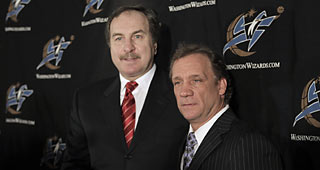In recent seasons, first overall picks have begun their careers in productive team situations. Derrick Rose, Greg Oden, Andrea Bargnani and Andrew Bogut each made the postseason as a rookie, playing on deep teams with quality personnel.
Dwight Howard was the most recent first overall pick to not make the playoffs as a rookie, as he was on a team with the ball-dominant Steve Francis.
LeBron James also missed out on the playoffs in his rookie season, while Yao Ming's 02-03 Rockets came one game short.
For John Wall and Blake Griffin, they are going to break that four-season streak of playoff basketball started by Bogut.
Playing with guys who struggle to comprehend basic concepts of team basketball (Andray Blatche, Nick Young and Al Thornton), makes life difficult for a point guard like Wall. Certain front offices might value character and basketball IQ a little too much, but these are clearly not your older brother's Sam Presti Sonics.
Washington made a very wise move in turning Gilbert Arenas into a better on-court fit and better locker room presence in Rashard Lewis, but they need to make another three or four moves like this, even if they are practically giving away the aforementioned players (particularly Blatche).
They also had the right idea in acquiring Kirk Hinrich and Chicago's first round pick, but that cap space climate has changed and it is unlikely another similar move is available unless a team wants to shed a young player for luxury tax purposes, such as Utah's trade of Eric Maynor last season.
Assuming Wall is able to get fully healthy, he is capable of maximizing the talent surrounding him in the same way we typically see from Chris Paul and Steve Nash. He can for example do for a player like Tyson Chandler what no point guard on the Bulls was able to do until he came to the Hornets.
The Sixty-Four Thousand Dollar Question is what type of player should the Wizards acquire to surround Wall?
Athletic slashers who can get to the rim (offensively and as rebounders), play solid defense and also (if humanly possible) hit better than 35% on wide open three-point attempts. These players also must be able to function without needing to put the ball on the floor because Wall will create better scoring chances than they will ever manufacture on their own. The fact that Wall is averaging nearly nine assists per 36 minutes with this supporting cast (as a rookie) is a testament to his capabilities and why it is completely realistic to expect him to eventually average 12 per night.
Desperation Meter: For the Wizards, 'desperate' is certainly a relative word. The Wizards have three more rookie contract years of Wall, which presents the unique opportunity of being able to field an affordable team since the best player is playing on an undervalued deal. This is why Chicago's payroll is at just $56.6M right now before Rose and Joakim Noah make more appropriate amounts.
Ernie Grunfeld has time to experiment and make mistakes and we don't typically see franchise players turn down extensions out of their rookie contract, but that trend could change with Wall (he has that fortitude) if the situation is deemed hopeless. Time flies on rookie contracts if the momentum of productive player acquisitions doesn't begin.
Looking at their roster, Washington doesn't have a single player on their roster that you would feel comfortable betting your life on as being part of the core in two seasons. Wall needs to be given a potential star, preferably a big, to grow with. That player, however, is almost certainly going to come via this coming draft and they will need to guess right before they improve out of the high lottery.
• Click here for the latest trade deadline rumors.



